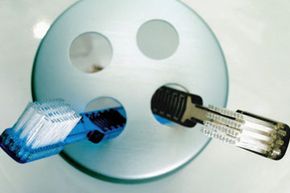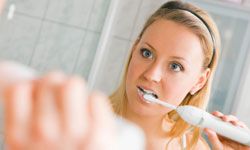You don't have to be a dentist to know that regular tooth-brushing is the cornerstone of good oral hygiene, but what the average person may not know is that the instrument he uses to clean his teeth may also need cleaning.
A toothbrush's job is to remove plaque and food particles from the teeth. As a result, it becomes contaminated with bacteria, blood, saliva, and even old toothpaste over time. The American Dental Association recommends that people change their toothbrush every three to four months (even if disinfected), but even this may not be enough to keep a toothbrush from becoming contaminated.And since they aren't required to be sold in a sterile package, a toothbrush can already have bacteria on it right out of the box [sources: ADA, CDC].
Advertisement
While cleaning your teeth with a "dirty" toothbrush might sound both like a waste of time and rather gross, currently there is no public research indicating that brushing with a contaminated toothbrush will lead to recontamination of the brusher's mouth, oral infections or other adverse health effects. That said, people with compromised immune systems are recommended to take extra precautions to keep their toothbrushes clean. For those people, as well as anyone who just gets the willies at the thought of using a grimy brush, there are a variety of methods disinfecting, sanitizing and decontaminating a toothbrush [source: CDC].
Ultraviolet (UV) light is one of the most common ways to disinfect a toothbrush. Typically, the brush head is stored in a small plastic container, which aims UV light at it for 6 to 8 minutes before and after brushing. Effervescent disinfecting tablets can also be used to sanitize toothbrushes; water and the tablet combine to create bubbles that sanitize the toothbrush as it soaks (about 10 minutes).
You don't necessarily have to go out and buy products specifically for disinfecting a toothbrush. Soaking a toothbrush in an antiseptic mouthwash, freezing or boiling the toothbrush or putting it in an automatic dishwasher are all ways in which a toothbrush can be cleaned without buying specialized products [source: WorlDental].
But before you start boiling water or freezing your toothbrush, read on for a few things you should know about toothbrush disinfection.
Advertisement

